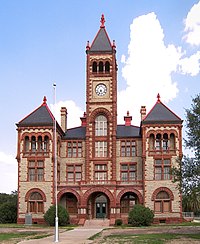DeWitt County, Texas
| DeWitt County, Texas | |
|---|---|

The DeWitt County Courthouse located in Cuero. The courthouse was added to the National Register of Historic Places on May 6, 1971.
|
|
 Location in the U.S. state of Texas |
|
 Texas's location in the U.S. |
|
| Founded | 1846 |
| Named for | Green DeWitt |
| Seat | Cuero |
| Largest city | Cuero |
| Area | |
| • Total | 910 sq mi (2,357 km2) |
| • Land | 909 sq mi (2,354 km2) |
| • Water | 1.5 sq mi (4 km2), 0.2% |
| Population | |
| • (2010) | 20,097 |
| • Density | 22/sq mi (8/km²) |
| Congressional district | 34th |
| Time zone | Central: UTC-6/-5 |
| Website | www |
DeWitt County is a county located in the U.S. state of Texas. As of the 2010 census, its population was 20,097. The county seat is Cuero. The county was founded in 1846 and is named for Green DeWitt, who founded an early colony in Texas.
Archeological digs indicate early habitation from the Paleo-Indians Hunter-gatherers period. Later, Tonkawa, Aranamas, Tamiques, Karankawa. Tawakoni, Lipan Apache and Comanche lived and hunted in the county.
The first European visitors to the county are thought to have beenÁlvar Núñez Cabeza de Vaca, Alonso del Castillo Maldonado, Andrés Dorantes de Carranza, and his slave Estevanico of the ill-fated 1528 Narváez expedition. French explorer René Robert Cavelier, Sieur de La Salle is believed to have crossed the county on his way westward from Victoria County; and while La Bahia was a common route, no evidence of any settlements exist before the Anglo homesteaders.
In 1825, empresario Green DeWitt received a grant from the Coahuila y Tejas legislature to settle 400 families. Between 1826 and 1831 settlers arrived from Tennessee, Kentucky, Missouri, and other Southern states.
...
Wikipedia
